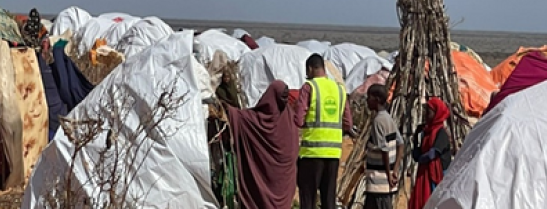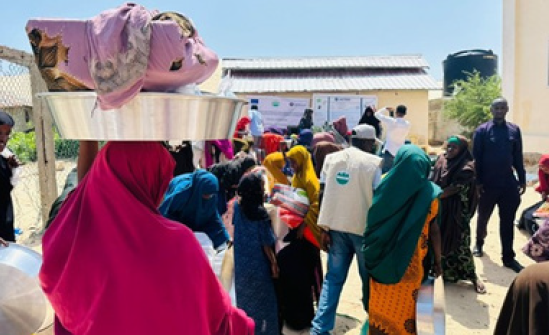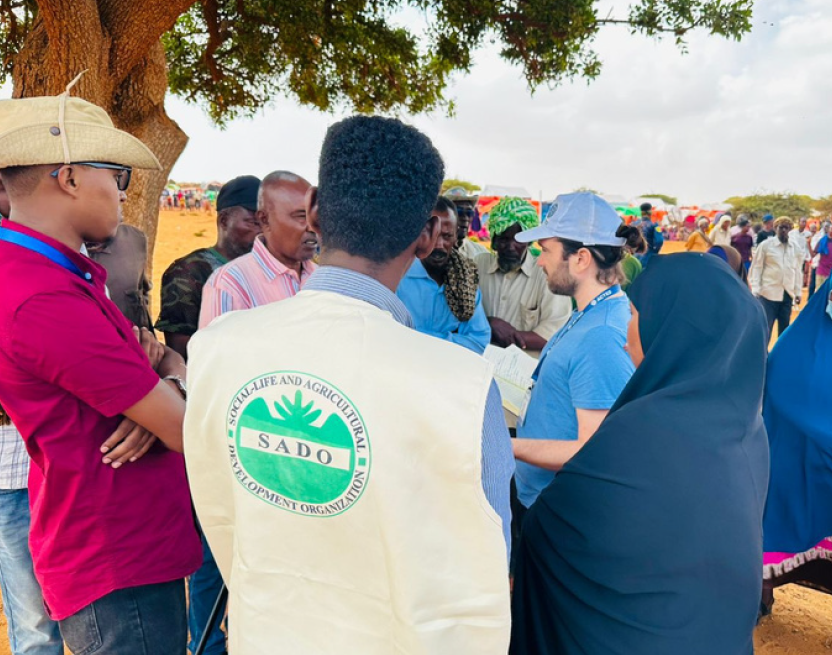Acted and SADO have been partners for more than 13 years ago and have worked together on numerous projects to the benefit of crisis-affected populations in Somalia. ”SADO focuses on addressing the needs of vulnerable populations, including internally displaced persons (IDPs) and communities affected by conflict, natural disasters, and food insecurity. SADO works in close collaboration with local communities, government entities, and international partners to deliver essential services and promote sustainable development.
Fatuma, Hassan and Kauthar are working for SADO as respectively Program coordinator, Senior Camp Coordination and Camp Management Officer (CCCM) and Project officer. They have accepted to share their experience.
“I recall that one of the earliest project of SADO in partnership with Acted started in 2009 in Saakow, Jubaland”, said Hussan, “and this shows the long lasting partnership between us”. Fatima added that together, SADO and Acted want to ensure that the humanitarian response is tailored to the specific needs and context of the affected communities in Somalia.
Investing in capacity building and knowledge transfer between local and international actors helps to strengthen the localization agenda and to promote equitable partnerships.
By leveraging our strengths and working together, we seek to effectively address the needs of vulnerable communities in Somalia and promote positive change.

With Acted, SADO has supported the most vulnerable people and provide life-saving assistance. For example, they constructed together a shallow well and water kiosks that supplied clean water to many households in Bula-gadud IDP site, Kismayo.
WASH activities implemented together by our staff in the field have ensured access to safe drinking water, improvement of hygiene and social wellbeing.
Working on CCCM
Kauthar is based in Garbaharey, Gedo Region, where SADO and Acted are implementing multi-sectoral projects (Food Security, Camp Coordination and Camp Management (CCCM), WASH) and also supporting women- led Civil Society Organizations (CSOs) through a peacebuilding project. In Somalia, the two organizations provided emergency shelters and non-food items to IDPs in the drought-affected regions. “This project aimed to address the urgent needs of displaced populations by providing them with safe and dignified shelter”, said Fatuma.
According to Fatuma, the partnership with Acted has allowed enhancing their CCCM approach by adopting a community-centered and participatory approach. This involves actively engaging with the affected communities in decision-making processes, ensuring their representation in camp management structures, and promoting their engagement in the planning and implementation of CCCM activities.
The partnership with Acted has provided us with technical support, training, and resources to strengthen our CCCM capacity and improve the overall quality of our interventions.

Building trust with local communities
“We are fully available for community through hotline, help-desk at field level, filling complain feedback mechanism through community mobilizers, holds site level coordination meeting and through partnership coordination meeting”, affirms Kauthar. “We also carry community mobilization and we organize external project kick off with the community and local authorities to present each project, so that they have a good understanding of the project components, communication channel, beneficiary selection criteria. We also ensure community project ownership through discussion and meeting with the community to know what are their priority needs, how they want the project to be implemented, and we collect communities’ feedback”.
In addition, the organizations actively engage with community leaders, elders, and communities representatives to understand their needs, concerns, and priorities. They also prioritize transparency and accountability in their operations by providing clear and accessible information.
The benefits of partnerships

For Kauthar, the most important for an equitable partnership is trust and mutual respect; clearly defined roles and responsibilities; flexibility and adaptability.
“Through our partnership with Acted, we have learned several valuable lessons”, said Fatuma. “Firstly, building strong and trusting relationships with international partners is important for effective collaboration and resource mobilization. In addition, investing in capacity building and knowledge transfer between local and international actors helps to strengthen the localization agenda and to promote equitable partnerships.”
Since the start of its partnership with Acted, SADO has been able to reinforce its policies, documentation, strategy, and grant management. “Partnership is all about trust and proper communication”, said Hassan.
In my opinion, local NGOs can reinforce their capacity through partnership with INGOs.